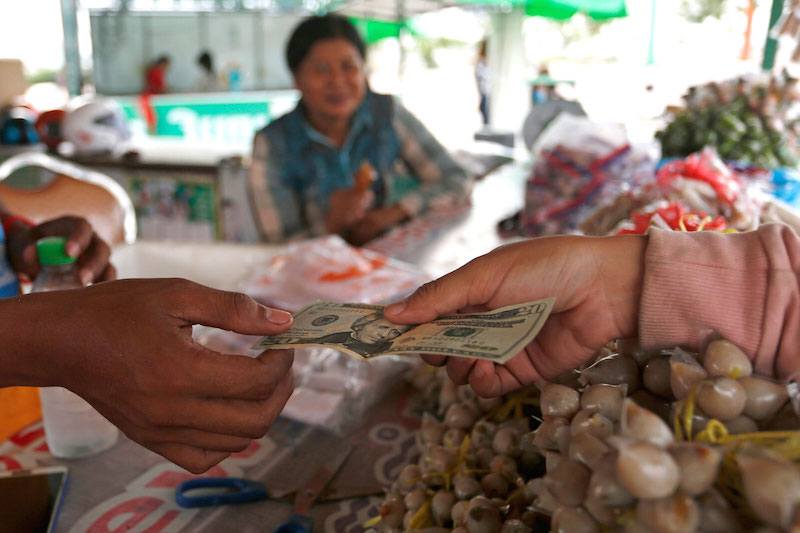Economists on Tuesday lambasted the CNRP’s proposal to eliminate the use of U.S. dollars for transactions in the country within one year of a victory in next year’s national elections, saying the policy would be “a disaster” and “impossible.”
But an opposition spokesman doubled down on the proposed rapid pace of so-called “de-dollarization,” even as some party members cast doubt on whether the party was unified behind the plan.

“If we don’t have our own currency, can we call it our own country?” CNRP spokesman Yim Sovann said on Tuesday. “To use Khmer riel in our own economy is a must.”
While Mr. Sovann backed away slightly from his earlier promise to eliminate the dollar within one year—saying that while he thought one year was possible, “a little bit shorter or a little bit longer” would also be fine—he flatly denied the process might take up to five years, conceding only that 18 months would be acceptable.
“Can’t we do it in one year?” he asked. “Yes.”
Economists on Tuesday disagreed, saying it could cripple Cambodia’s economy—if it was even possible.
“I think it could be a disaster, in terms of confidence,” said Chan Sophal, director of the Centre for Policy Studies. “To change overnight, to change it in one year, it will cause a lot of disruption.”
Chou Ngeth, senior consultant at Emerging Markets Consulting, said the plan was “impossible.”
“Salary payments in the private sector…are still in U.S. dollars,” Mr. Ngeth said. “It needs a lot of effort to build into the current systems, to transform from U.S. dollars to riel.”
Asked if he thought the plan was feasible, Miguel Chanco, lead Southeast Asia analyst for the Economist Intelligence Unit, replied: “Absolutely not.”
“The use of dollars in Cambodia is still far too widespread for this goal to be achieved in a year, let alone a full decade,” Mr. Chanco said, pointing to neighboring Vietnam, which took a decade to decrease its foreign currency deposits from 30 percent to 12 percent.
Cambodia currently has 95 percent of its deposits in foreign currency, Mr. Chanco said.
The CNRP’s Mr. Sovann was unfazed by the criticisms.
“Let them do their job, and I will do my job,” Mr. Sovann said of the economists. “If the leader of the country cannot use their own currency in the economy, it is a shame.”
Meanwhile, senior CNRP lawmaker Son Chhay said Mr. Sovann’s proposal was not yet a formal party policy.
“The policy was only suggested by Sovann, but the party has not agreed on that yet,” Mr. Chhay said on Tuesday. “We have to do further study.”
Kem Monovithya, the party’s deputy director of public affairs, did not respond to an email requesting a clarification of the opposition’s policy.
Former CNRP President Sam Rainsy, who is currently exiled in France but still features prominently in the opposition’s campaigning, said in an email that Mr. Sovann’s call for de-dollarization was spot-on, even if his timeline was too rigid.
“Yim Sovann is right in pointing to the need to urgently decrease the level of dollarization,” Mr. Rainsy wrote. “[But] how fast or how gradually this can be achieved will depend on the circumstances and opportunities occurring when the CNRP comes to power and starts to [restore] confidence in Cambodia’s economy under a democratic government.”
Meanwhile, political analyst Cham Bunthet struggled to explain why the CNRP might be pushing such an economically controversial policy, given the lack of an obvious political upside.
“I think they try to build a sense of nationalism, to promote Khmer riel,” said Mr. Bunthet, who is also an adviser to the Grassroots Democracy Party. “But politically, I don’t think that really influences the voters.”